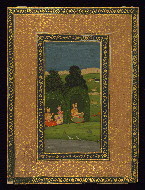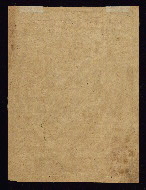Home > Digitized Walters Manuscripts
This document is a tranformation of a TEI P5 XML manuscript description incorporating images. If you have trouble reading special or non-Latin characters on this page, please make sure you have appropriate Unicode fonts installed and an up-to-date web browser.
Walters Ms. W.876, Single leaf of Nayaka and attendants in leafy bowers
Browse images (Browse images in a new window) | TEI in XML format
W.876
Single leaf of Nayaka and attendants in leafy bowers
This painting, dating to the twelfth century AH / eighteenth CE, depicts three women seated within two leafy bowers. The Nayaka (female lover or heroine) sits alone, while her two female companions, known as sakhis, converse in the other bower. The painting may represent Utka nayaka, a classification for heroines who are awaiting or yearning for their lovers. Often, they are shown on a bed of flowers or leaves that they have prepared in expectation of meeting their lovers. In the landscape are animals engaged in various activities. An outcrop of rocks in the distance forms a horizon, above which is a blue sky streaked with light gray or white washes to suggest a thin layer of high clouds.
ca. 1750 CE
Delhi (?)
Leaf
Historical
No linguistic content; Not applicable
Paper
Mounted on pasteboard
Foliation: Not applicable
22.0 cm wide by 30.0 cm high
- Image: 9.5 cm wide by 18.4 cm high
- Title: Nayaka and attendants in leafy bowers
- Decoration note: Borders of salmon and blue with floral illuminated motifs
fol. W.876a:

- Title: Nayaka and attendants in leafy bowers
- Form: Painting
- Label: This painting, dating to the twelfth century AH / eighteenth CE, depicts three women seated within two leafy bowers. The Nayaka (female lover or heroine) sits alone, while her two female companions, known as sakhis, converse in the other bower. The painting may represent Utka nayaka, a classification for heroines who are awaiting or yearning for their lovers. Often, they are shown on a bed of flowers or leaves that they have prepared in expectation of meeting their lovers. In the landscape are animals engaged in various activities. An outcrop of rocks in the distance forms a horizon, above which is a blue sky streaked with light gray or white washes to suggest a thin layer of high clouds.
fol. W.876b:
Gift of John and Berthe Ford, 2001
Pal, Pratapaditya. Desire and Devotion: Art from India, Nepal, and Tibet in the John and Berthe Ford Foundation. (London: Phillip Wilson, 2001), 167.
Principal cataloger: Gacek, Adam
Catalogers: Landau, Amy; Smith, Sita
Editor: Bockrath, Diane
Conservators: Jewell, Stephanie; Quandt, Abigail
Contributors: Barrera, Christina; Emery, Doug; Herbert, Lynley; Noel, William; Simpson, Shreve; Tabritha, Ariel; Toth, Michael B.; Valle, Chiara
The Walters Art Museum
Licensed for use under Creative Commons Attribution-NonCommercial-ShareAlike 3.0 Unported Access Rights, http://creativecommons.org/licenses/by-nc-sa/3.0/legalcode. It is requested that copies of any published articles based on the information in this data set be sent to the curator of manuscripts, The Walters Art Museum, 600 North Charles Street, Baltimore MD 21201.
